
Op koppen lopen!
13.09.2025 09:35 — 👍 4 🔁 1 💬 0 📌 0@paularblaster.bsky.social
Historian and translator

Op koppen lopen!
13.09.2025 09:35 — 👍 4 🔁 1 💬 0 📌 0
"Despite any major upgrade in translation quality", in fact despite a notable decline in translation quality. But as Les Murray put it forty years ago, writing about sixty years ago:
22.08.2025 09:27 — 👍 8 🔁 1 💬 0 📌 0
First-hand account of Don Fadrique de Toledo's recapture of São Salvador da Bahia de Todos os Santos in 1625 (part 4)

First-hand account of Don Fadrique de Toledo's recapture of São Salvador da Bahia de Todos os Santos in 1625 (part 5)
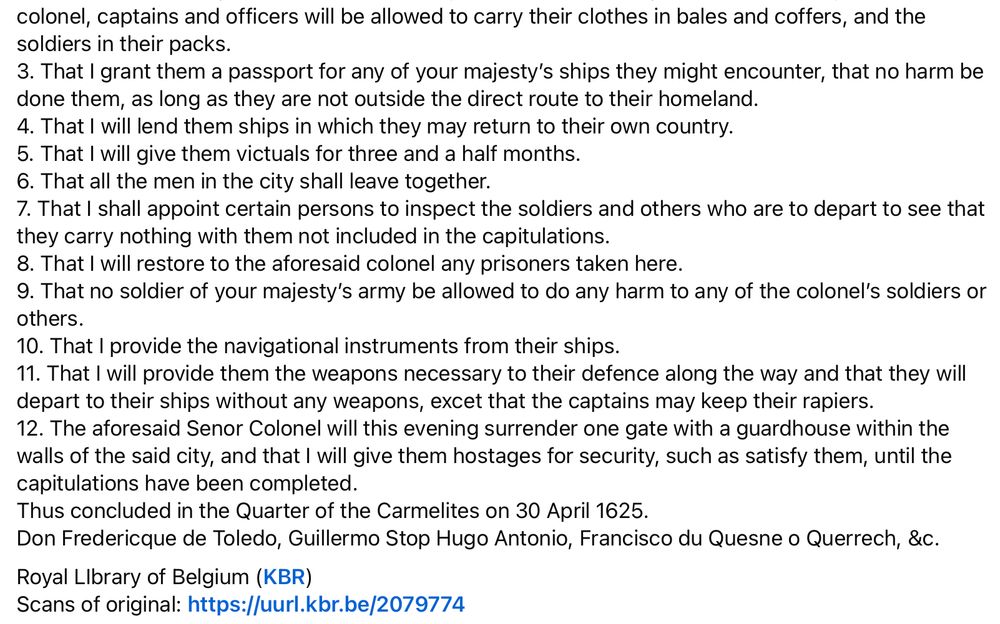
First-hand account of Don Fadrique de Toledo's recapture of São Salvador da Bahia de Todos os Santos in 1625 (part 6)
22.08.2025 08:18 — 👍 1 🔁 0 💬 0 📌 0
Front page of Nieuwe Tijdinghen 1625 issue 84, published 22 August, with headline, woodcut and printer's address.

First-hand account of Don Fadrique de Toledo's recapture of São Salvador da Bahia de Todos os Santos in 1625 (part 1)

First-hand account of Don Fadrique de Toledo's recapture of São Salvador da Bahia de Todos os Santos in 1625 (part 2)

First-hand account of Don Fadrique de Toledo's recapture of São Salvador da Bahia de Todos os Santos in 1625 (part 3)
Don Fadrique de Toledo's report on recapturing the Brazilian city of São Salvador da Bahia de Todos os Santos from the Dutch, as published in Antwerp 400 years ago today.
22.08.2025 08:16 — 👍 2 🔁 1 💬 1 📌 0Thanks!
16.08.2025 11:04 — 👍 1 🔁 0 💬 0 📌 0



News published in Antwerp 400 years ago: the emperor asking for money and supplies for the Hungarian frontier, imperial forces gearing up for the Danish phase of the Thirty Years' War, and a brief mention of the Duke of Savoy being forced onto the defensive by the Republic of Genoa.
16.08.2025 11:04 — 👍 8 🔁 5 💬 1 📌 0Opens in a month!
16.08.2025 10:30 — 👍 0 🔁 0 💬 0 📌 0
Happy to have been involved in this, in however small a way.
museumplantinmoretus.be/en/Womensbus...
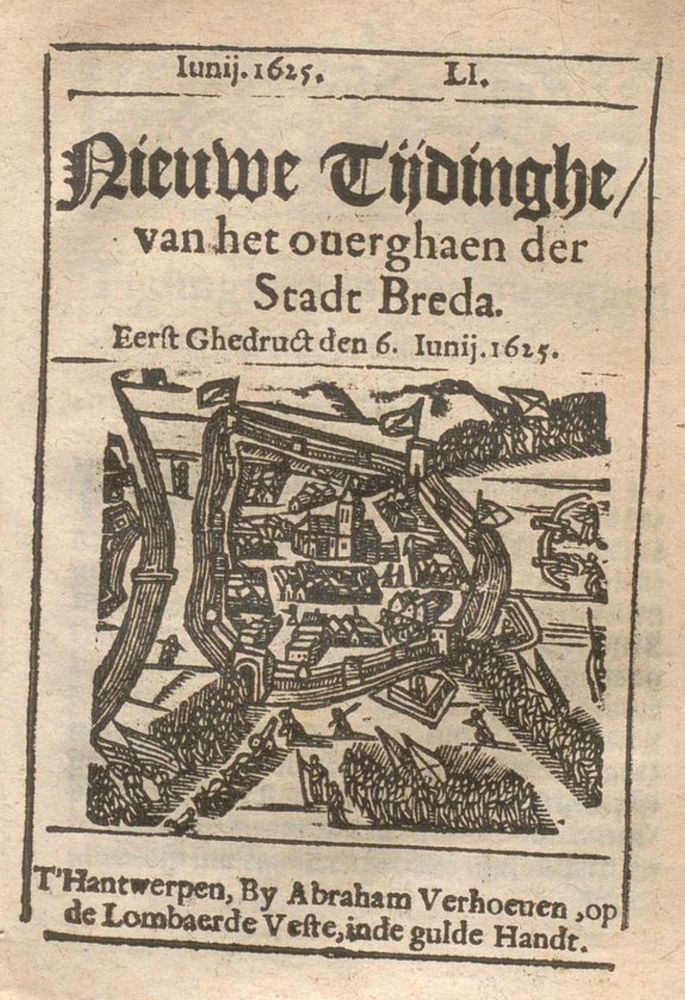
News of the surrender of Breda from Nieuwe Tijdinghen 1625 issue 51 (6 June): Nieuwe Tijdinghe, van het overghaen der Stadt Breda.
![NEWS OF THE SURRENDER OF BREDA: Last Saturday, 31 May 1625, those of Breda began to parley for a good agreement to surrender the town to his royal majesty, finding themselves in extreme need. At 9 in the morning on Saturday his excellency Count Henry of Bergh went towards the town with a large entourage of noblemen, with his trumpeters at the front, and arriving beneath [the walls of] the town, remained there quietly. At once the deputies of the town came out in a coach, and there they greeted one another and began discussions for an agreement, which lasted until 1 o’clock in the afternoon. Agreement was reached between the town and the battery, and once it was concluded all returned, leaving mutual hostages. Those within the town demanded many conditions, but not all were granted. At parting the gentlemen congratulated one another festively when taking their leave.
On Sunday, 1 June, the agreement was concluded on condition that those within should depart from the town on Wednesday, 4 June, with arms and baggage, and colours, with all their sick, and they would be provided with wagons for the purpose, so that on Wednesday the wagons were loaded, but as not all was ready the enemy left the town early in the morning on Thursday, 5 June, taking many sick with them, some said 700. Everything was running short in the town, they still had bread for a few days. The governor said that all the citizens who had brought gold and silver from which to strike coin would have the same made good by the States. Square silver coins were struck for two guilders, and some for one guilder the piece, and a copper, with the arms of the town, with the inscription ‘Breda obsessa, 1625’.](https://cdn.bsky.app/img/feed_thumbnail/plain/did:plc:xzhze6vbawt6p77vqqtalnfg/bafkreiekpel3uz2sulnpkmgiqlkdcmfeftqjum34ofynbr62qvrrfjm7aa@jpeg)
NEWS OF THE SURRENDER OF BREDA: Last Saturday, 31 May 1625, those of Breda began to parley for a good agreement to surrender the town to his royal majesty, finding themselves in extreme need. At 9 in the morning on Saturday his excellency Count Henry of Bergh went towards the town with a large entourage of noblemen, with his trumpeters at the front, and arriving beneath [the walls of] the town, remained there quietly. At once the deputies of the town came out in a coach, and there they greeted one another and began discussions for an agreement, which lasted until 1 o’clock in the afternoon. Agreement was reached between the town and the battery, and once it was concluded all returned, leaving mutual hostages. Those within the town demanded many conditions, but not all were granted. At parting the gentlemen congratulated one another festively when taking their leave. On Sunday, 1 June, the agreement was concluded on condition that those within should depart from the town on Wednesday, 4 June, with arms and baggage, and colours, with all their sick, and they would be provided with wagons for the purpose, so that on Wednesday the wagons were loaded, but as not all was ready the enemy left the town early in the morning on Thursday, 5 June, taking many sick with them, some said 700. Everything was running short in the town, they still had bread for a few days. The governor said that all the citizens who had brought gold and silver from which to strike coin would have the same made good by the States. Square silver coins were struck for two guilders, and some for one guilder the piece, and a copper, with the arms of the town, with the inscription ‘Breda obsessa, 1625’.
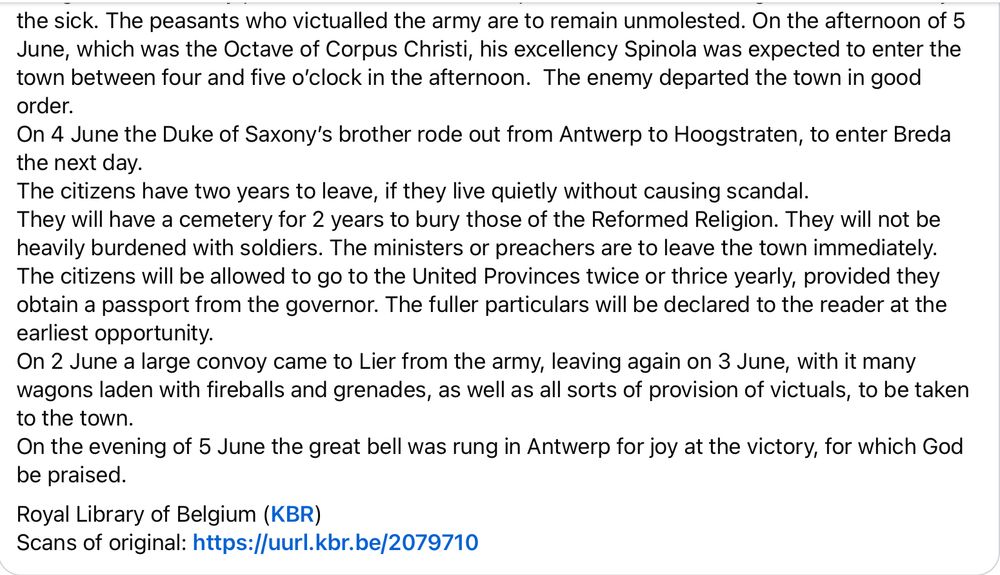
The citizens obtained a good agreement, the particular articles of which will soon be published at length. It is said the enemy was granted 2 artillery pieces. From Holland 25 ships came to the Plate to go to Breda to carry the sick. The peasants who victualled the army are to remain unmolested. On the afternoon of 5 June, which was the Octave of Corpus Christi, his excellency Spinola was expected to enter the town between four and five o’clock in the afternoon. The enemy departed the town in good order. On 4 June the Duke of Saxony’s brother rode out from Antwerp to Hoogstraten, to enter Breda the next day. The citizens have two years to leave, if they live quietly without causing scandal. They will have a cemetery for 2 years to bury those of the Reformed Religion. They will not be heavily burdened with soldiers. The ministers or preachers are to leave the town immediately. The citizens will be allowed to go to the United Provinces twice or thrice yearly, provided they obtain a passport from the governor. The fuller particulars will be declared to the reader at the earliest opportunity. On 2 June a large convoy came to Lier from the army, leaving again on 3 June, with it many wagons laden with fireballs and grenades, as well as all sorts of provision of victuals, to be taken to the town. On the evening of 5 June the great bell was rung in Antwerp for joy at the victory, for which God be praised.
News from 400 years ago: the surrender of Breda.
06.06.2025 18:00 — 👍 15 🔁 5 💬 0 📌 0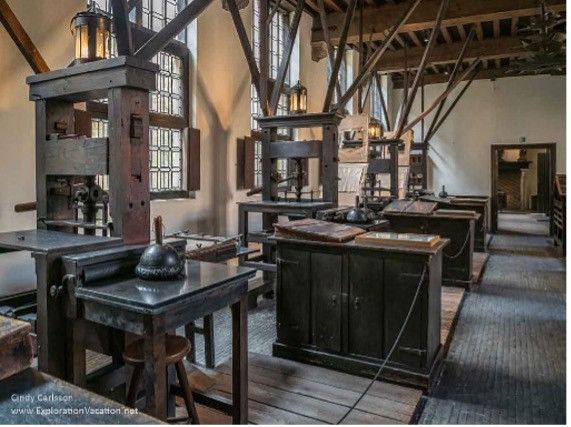
Tudor England and the Antwerp Book Trade (8-11 July)
Registration open for a few more days:
www.uantwerpen.be/en/conferenc...
Scans of original from the Royal Library of Belgium: uurl.kbr.be/2079708
31.05.2025 17:18 — 👍 0 🔁 1 💬 0 📌 0Programme: www.uantwerpen.be/en/conferenc...
31.05.2025 17:15 — 👍 0 🔁 0 💬 0 📌 0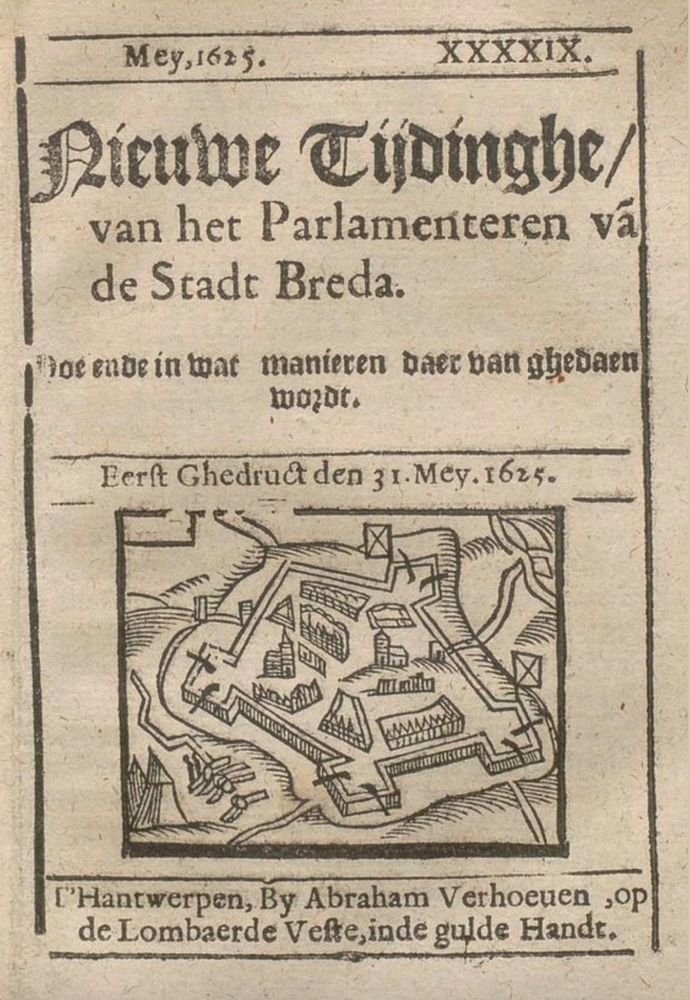
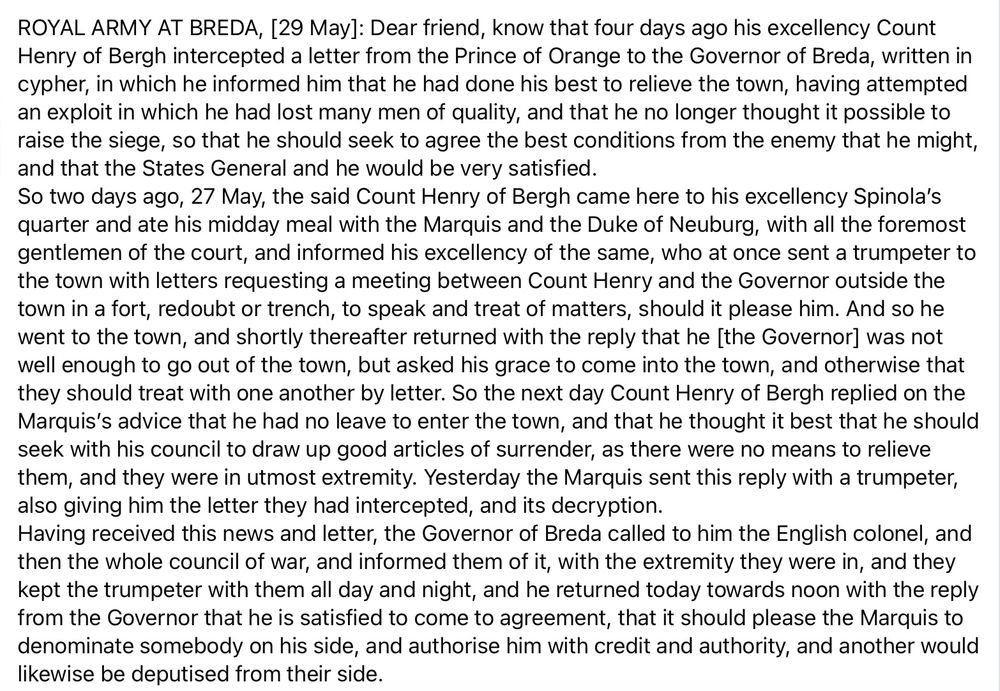
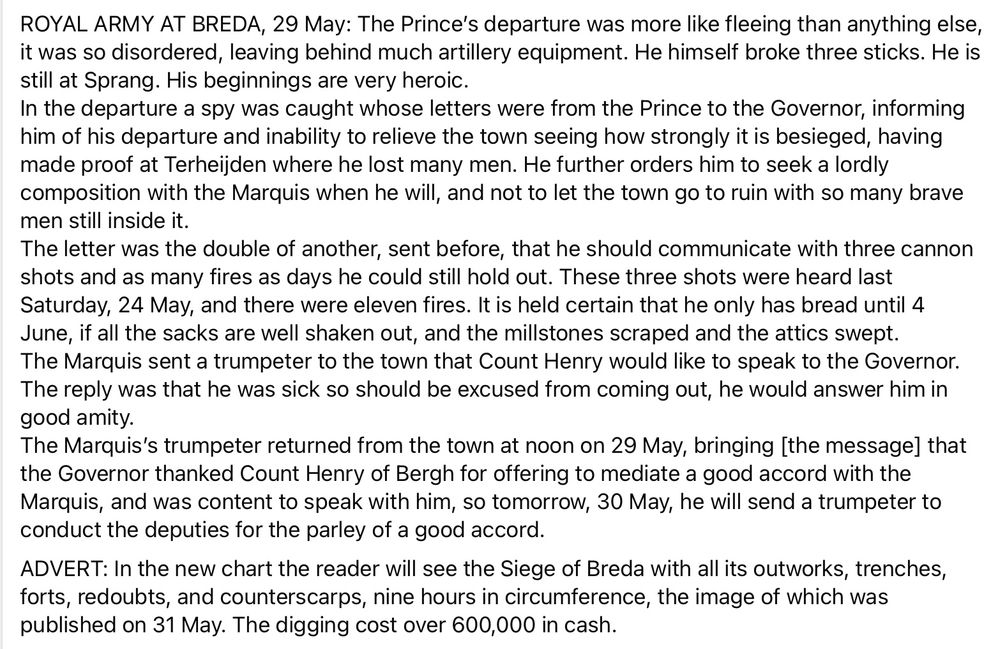
400 years ago today, news broke in Antwerp that the surrender of Breda was being negotiated.
31.05.2025 17:08 — 👍 6 🔁 1 💬 1 📌 0
Surprising this should be topical again.
www.youtube.com/watch?v=Xfi0...

Leuven is looking for a #BookHistory collection expert and conservator. And I now REALLY wish I had made a move on the plans to get training and accreditation in library and archive work.
Go and get my dreamjob and continuously make me superenvious:

If anybody knows somebody who would want to teach English skills to (mostly) French-speaking undergraduates in Brussels while carrying out research into some aspect of translation or interpreting: jobs.uclouvain.be/Personnelsci...
04.05.2025 22:24 — 👍 8 🔁 19 💬 0 📌 0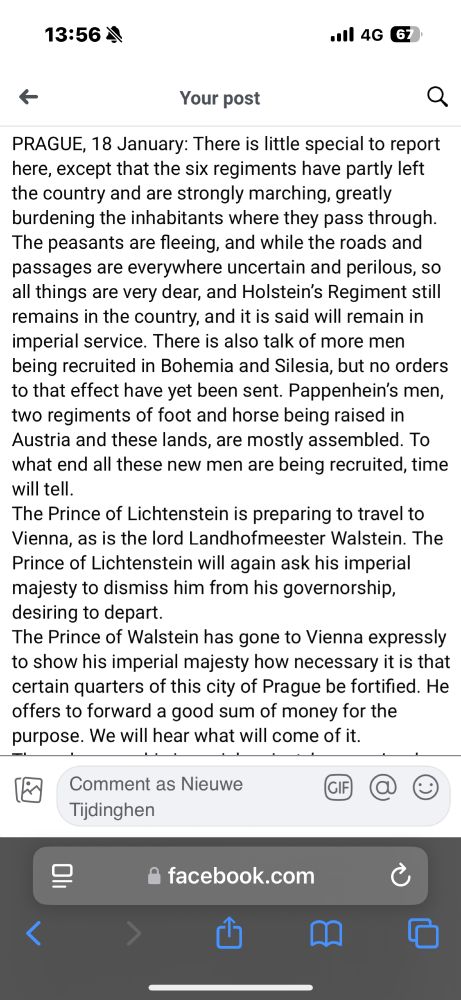
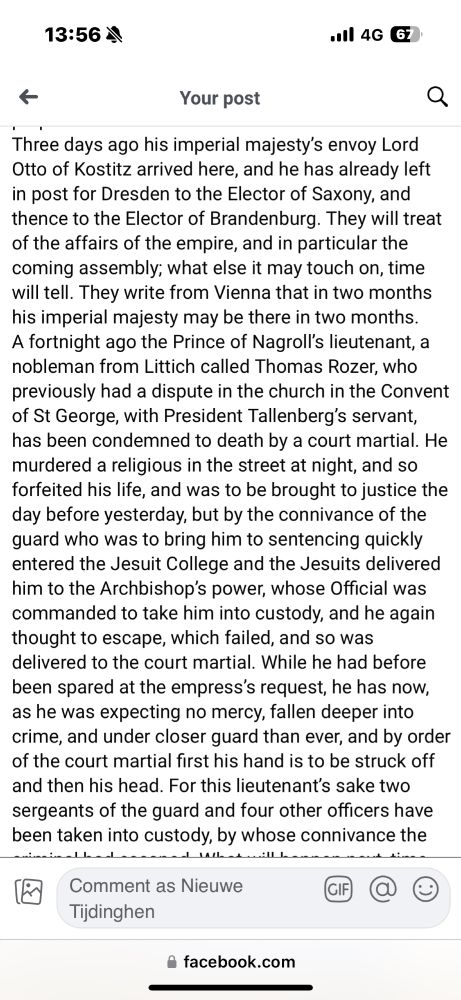 10.02.2025 13:10 — 👍 0 🔁 0 💬 0 📌 0
10.02.2025 13:10 — 👍 0 🔁 0 💬 0 📌 0
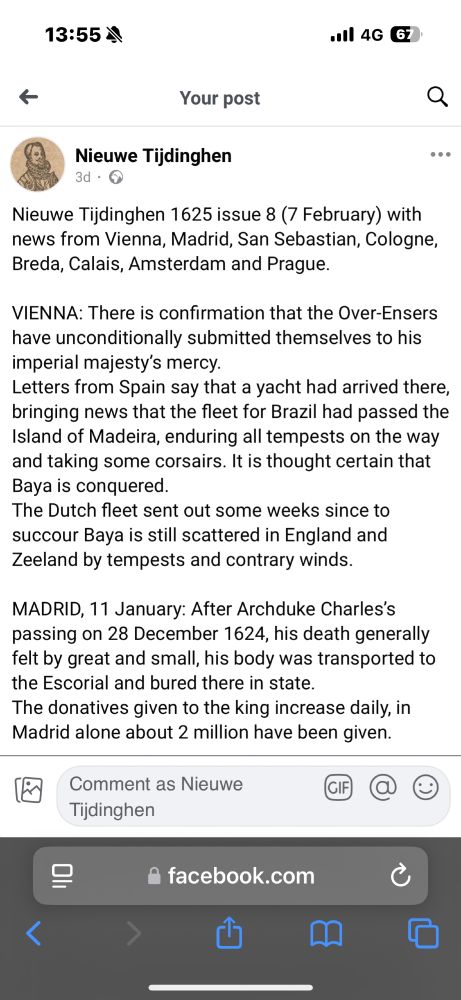
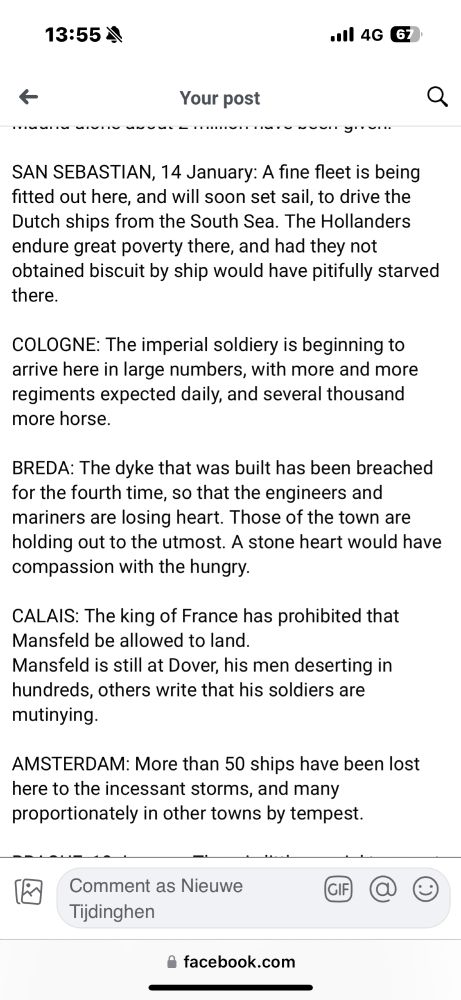 10.02.2025 13:10 — 👍 0 🔁 0 💬 1 📌 0
10.02.2025 13:10 — 👍 0 🔁 0 💬 1 📌 0
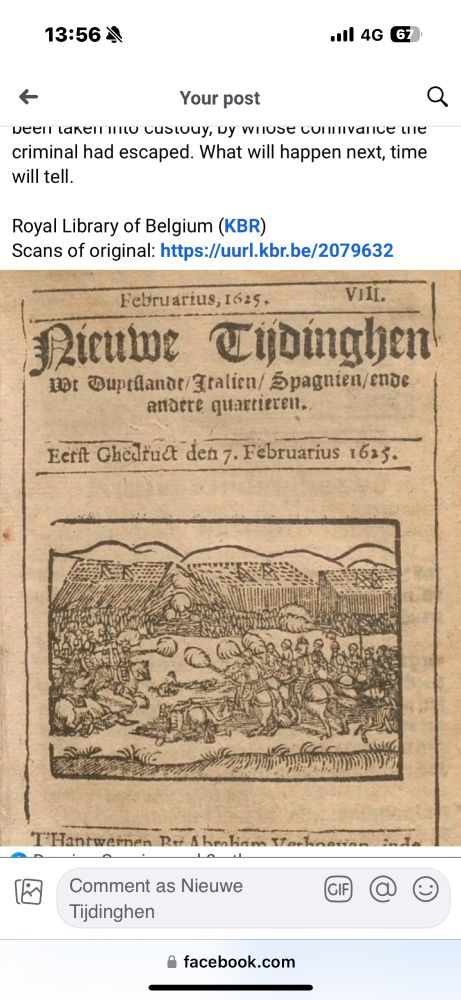
News from 400 years ago …
10.02.2025 13:10 — 👍 1 🔁 0 💬 1 📌 0Can't remember if I ever got round to sharing this link:
www.uantwerpen.be/en/conferenc...
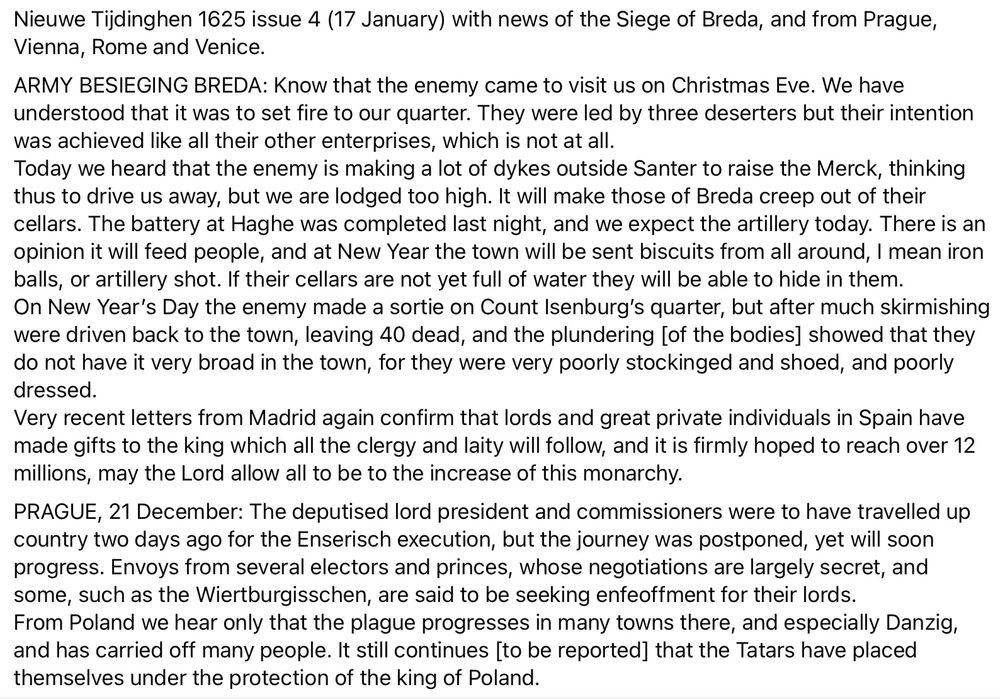
News from the army besieging Breda and from Prague published in Antwerp on 17 January 1625.
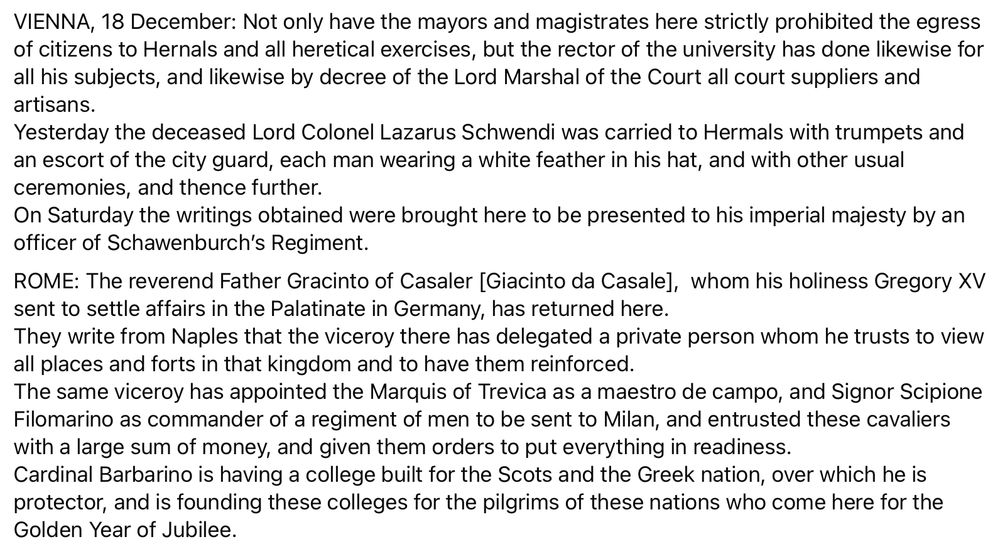
News from Vienna and Rome published in Antwerp on 17 January 1625.

News from Venice published in Antwerp on 17 January 1625.
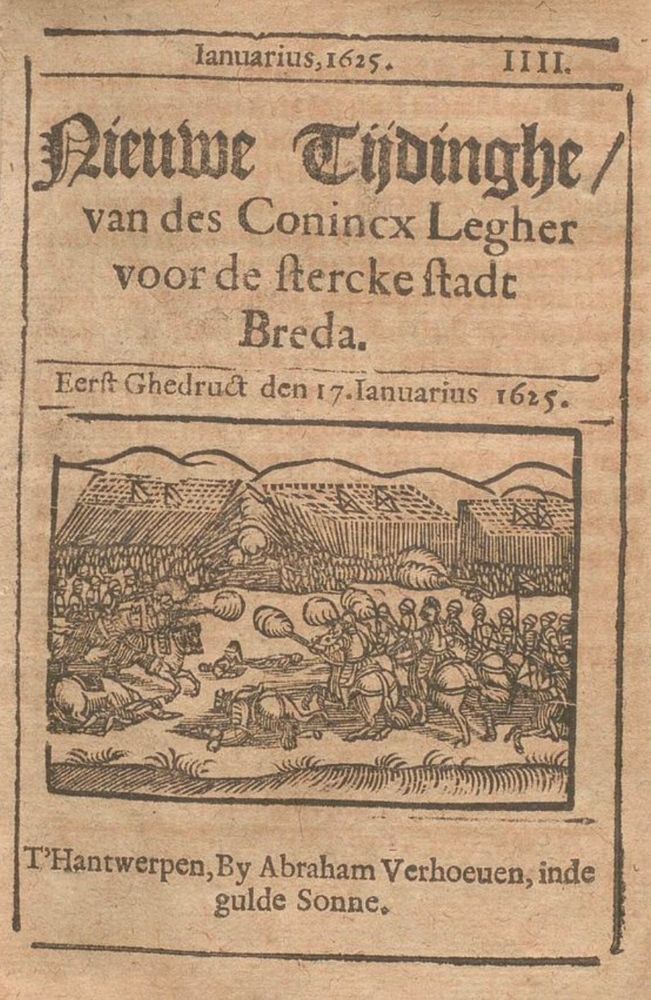
Front page of the Nieuwe Tijdinghen (New Tidings) published in Antwerp on 17 January 1625.
News from 400 years ago.
17.01.2025 16:50 — 👍 8 🔁 3 💬 0 📌 0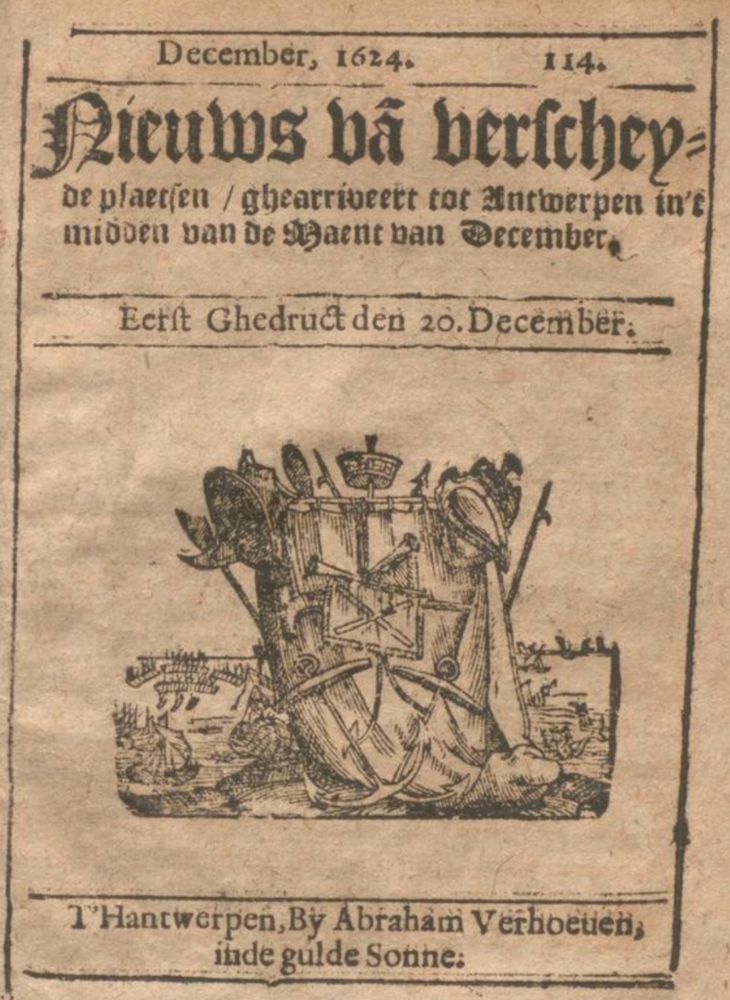
Front page of Nieuwe Tijdinghen 114 (20 December 1624)
Nieuwe Tijdinghen 114 (20 December 1624)
19.12.2024 22:45 — 👍 2 🔁 1 💬 0 📌 0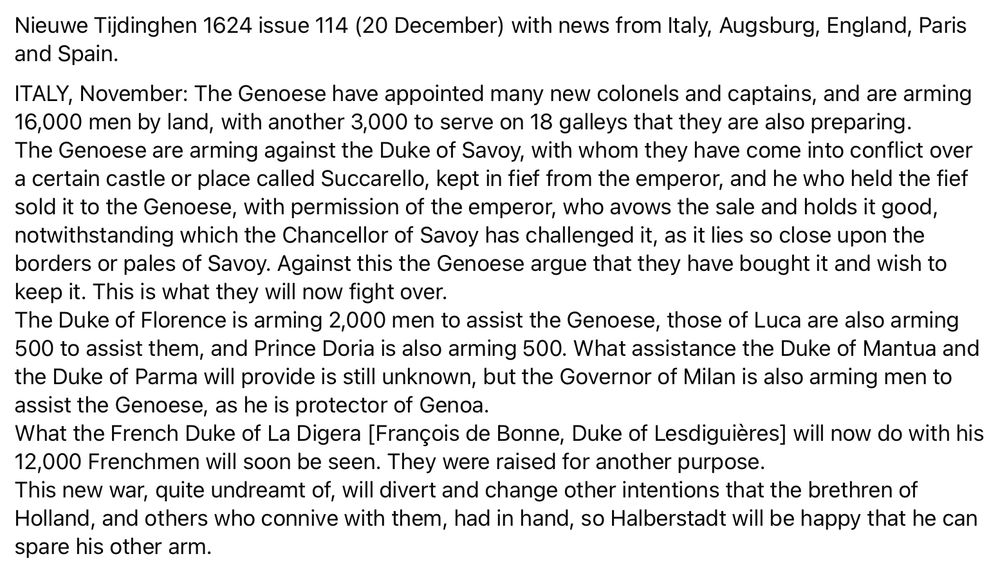
News from Italy in Nieuwe Tijdinghen 1624 issue 114
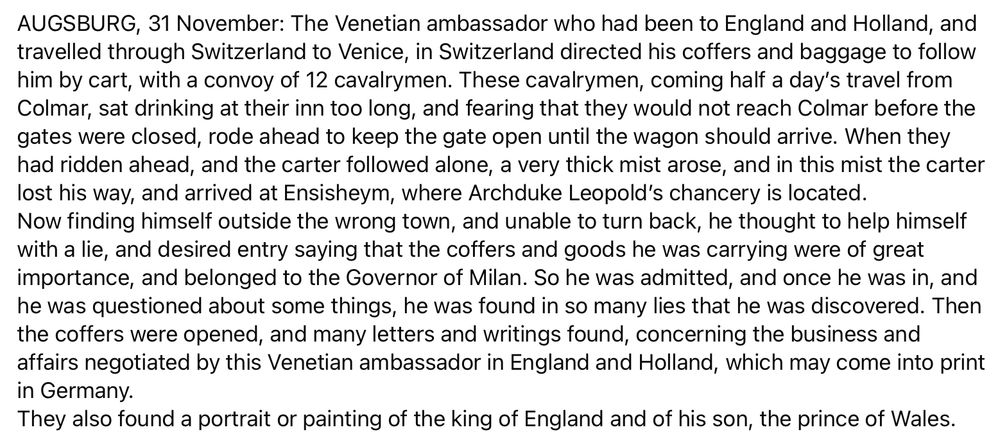
News from Augsburg in Nieuwe Tijdinghen 1624 issue 114
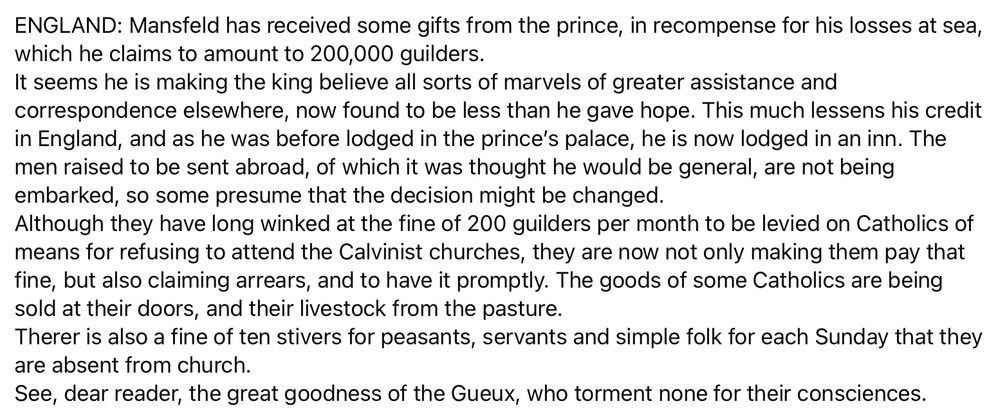
News from England in Nieuwe Tijdinghen 1624 issue 114

News from Paris and Spain (Madrid?) in Nieuwe Tijdinghen 1624 issue 114
19.12.2024 22:45 — 👍 1 🔁 0 💬 1 📌 0I want to know more about this manuscript!
16.12.2024 22:11 — 👍 1 🔁 0 💬 1 📌 0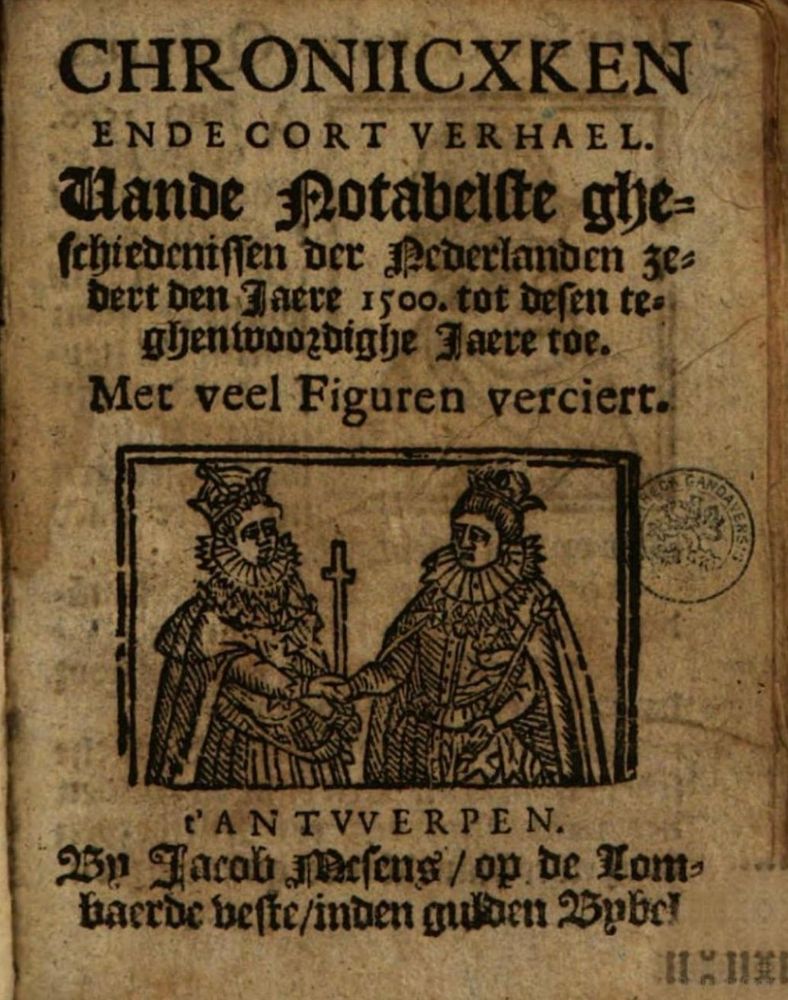
Front page of a 17th-century chronicle, depicting a royal couple (presumably the Habsburg rulers of the Low Countries, Albert and Isabella)
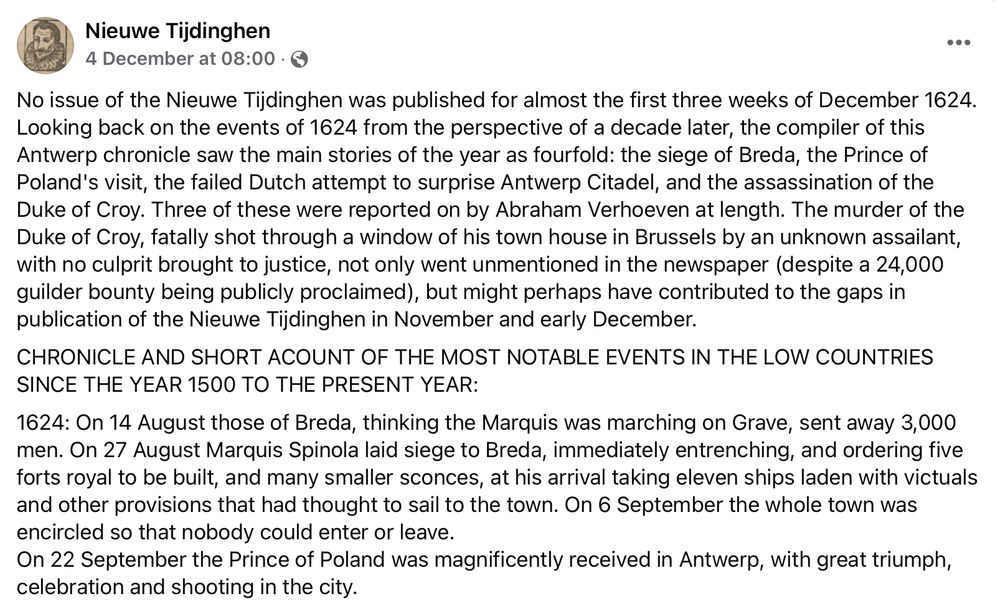
Translation of text from a 17th-century chronicle
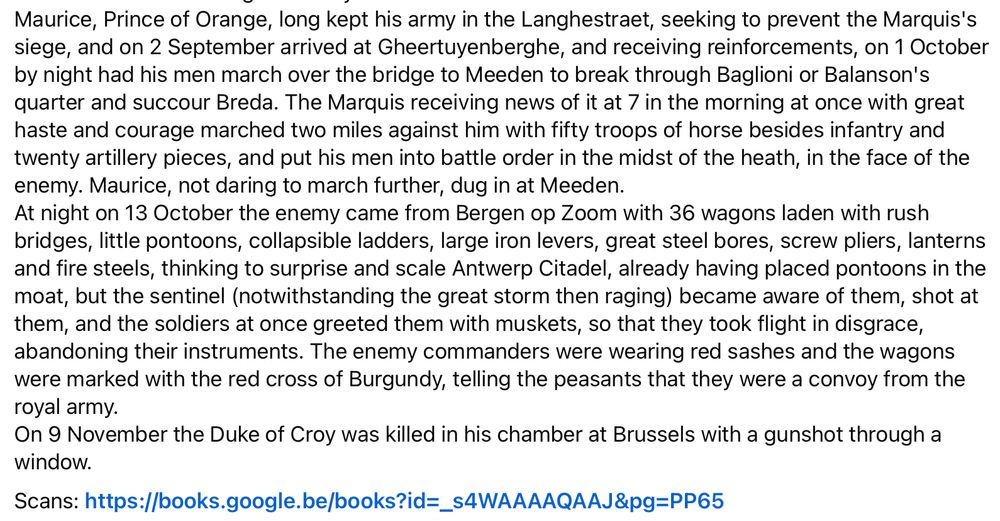
Translation of text from a 17th-century chronicle
Is it worth sharing these here?
07.12.2024 13:56 — 👍 4 🔁 1 💬 2 📌 0bsky.app/profile/zann...
27.11.2024 03:59 — 👍 0 🔁 1 💬 0 📌 0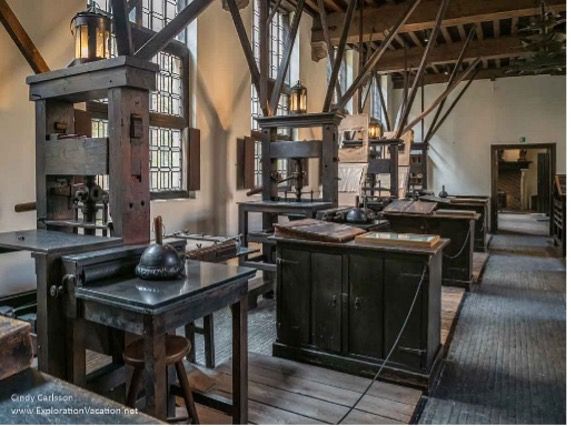
CFP: Tudor England and the Antwerp Book Trade
Conference (Antwerp University) and display of 16th-century books (Plantin-Moretus Museum)
Antwerp, Tuesday 8 – Friday 11 July 2025
Link to follow when available ...
Sorry to have missed it!
15.11.2024 23:18 — 👍 0 🔁 0 💬 0 📌 0